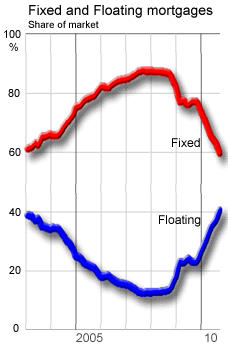Watch on our video page here.  Watch on YouTube here. Bernard Hickey delivers a housing report in association with the BNZ on how the landscape for fixed and variable mortgages has shifted fundamentally in the last 18 months. Back before the Global Financial Crisis, banks were able to get cheap short term funding on international markets and shuffle it on to New Zealand home owners in the form of relatively low fixed mortgage rates. Back in late 2007 almost 90% of home owners had fixed rate mortgages because for the previous 8 years the rates had typically been lower than variable rates. This contrasts with the situation in Australia where more than 90% of home owners use variable rather than fixed rates because variable rates are typically lower there.
Watch on YouTube here. Bernard Hickey delivers a housing report in association with the BNZ on how the landscape for fixed and variable mortgages has shifted fundamentally in the last 18 months. Back before the Global Financial Crisis, banks were able to get cheap short term funding on international markets and shuffle it on to New Zealand home owners in the form of relatively low fixed mortgage rates. Back in late 2007 almost 90% of home owners had fixed rate mortgages because for the previous 8 years the rates had typically been lower than variable rates. This contrasts with the situation in Australia where more than 90% of home owners use variable rather than fixed rates because variable rates are typically lower there.  But that has all changed in New Zealand in the last 18 months as the Global Financial Crisis and moves by both central banks and global regulators have forced banks to raise more money locally and for longer terms, meaning their fixed mortgage rates have risen relative to variable rates. The average 2 year bank mortgage rate has risen from 5.9% last February to 7.2% now, while the variable rate has fallen from 6.7% to 6%. This has reversed a pecking order in place for nearly a decade. The proportion of homeowners who have variable rate mortgages has more than doubled to 26% in the last 18 months. The decision about going fixed versus variable depends on a variety of factors. If a borrower believes the Official Cash Rate set by the Reserve Bank is about to go up fast and soon then it may make sense to fix, but if the OCR is expected to stay steady for an extended period then a variable rate makes sense. Currently economists expect the OCR to remain on hold until early June or late July, before rising to around 4.25% in a year's time. Anyone who goes variable is also making a decision about whether the market will go back to 'normal'. That would depend on international markets settling down again and central bankers easing off on restrictions on capital or liquidity. Both are unlikely.
But that has all changed in New Zealand in the last 18 months as the Global Financial Crisis and moves by both central banks and global regulators have forced banks to raise more money locally and for longer terms, meaning their fixed mortgage rates have risen relative to variable rates. The average 2 year bank mortgage rate has risen from 5.9% last February to 7.2% now, while the variable rate has fallen from 6.7% to 6%. This has reversed a pecking order in place for nearly a decade. The proportion of homeowners who have variable rate mortgages has more than doubled to 26% in the last 18 months. The decision about going fixed versus variable depends on a variety of factors. If a borrower believes the Official Cash Rate set by the Reserve Bank is about to go up fast and soon then it may make sense to fix, but if the OCR is expected to stay steady for an extended period then a variable rate makes sense. Currently economists expect the OCR to remain on hold until early June or late July, before rising to around 4.25% in a year's time. Anyone who goes variable is also making a decision about whether the market will go back to 'normal'. That would depend on international markets settling down again and central bankers easing off on restrictions on capital or liquidity. Both are unlikely.
Housing report: Why many home owners are switching to variable
Housing report: Why many home owners are switching to variable
5th Feb 10, 5:33pm
by

We welcome your comments below. If you are not already registered, please register to comment
Remember we welcome robust, respectful and insightful debate. We don't welcome abusive or defamatory comments and will de-register those repeatedly making such comments. Our current comment policy is here.